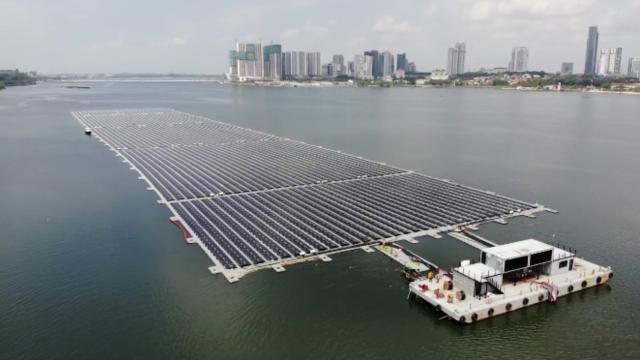A company in Singapore has just completed construction on a massive floating solar farm. What makes it particularly unique is that its offshore in the Straits of Johor.
Floating solar farms are becoming more common
Floating solar farms are often constructed in countries where there isn’t a lot of available land. These are usually built on in-land bodies of water. We even have them in Australia.
It’s rarer to find solar farms built in the ocean. In fact, the first was only completed in the Dutch North see at the end of 2019.
Now Singapore has followed suit, partially due to the lack of space.
Singapore’s floating solar farm is a bit more rare
As a solution, solar energy company Sunseap built its 5MW peak solar farm in the sea. It is one of the largest of its kind in the world, with 13,312 panels, 40 inverters and more than 30,000 floats.
“We are very pleased to announce the successful completion of Singapore and Sunseap’s first offshore floating photovoltaic system,” said Sunseap CEO, Frank Phuan, in a statement.
“This is an important milestone for Sunseap as we believe that offshore space like the sea, reservoirs, lakes etc, offers exciting opportunities for land-scarce and densely populated cities to tap solar energy. They are places that are unobscured from the sun and with low risks of vandalism or theft.
[related_content first=”1671679″]
“We believe that we at Sunseap have honed our experience and expertise in offshore floating PV systems from the completion of this project and are well placed to help our clients access this new frontier for solar energy.”
While this particular solar farm is offshore, Public Utilities Board (PUB) National Water Agency is constructing an even larger 60MW floating solar farm. It will be situated on the Tengeh Reservoir, which sits between on the border between Singapore and Malaysia.
According to Renew Economy, it will “bring Singapore’s National Water Agency up to 100% renewable power and will generate enough clean energy to power PUB’s local water treatment plants.”
The potential impacts are currently being studied
Interestingly, the University of Lancaster in the UK just completed the first detailed modelling of the impact that floating solar farms could have on bodies of water.
One potential benefit could be mitigating the impacts of climate change due to shading the water from the sun, which can prevent blooming of toxic blue and green algae as well as water evaporation.
However, the researchers did also state that it was early days.
“As demand for land increases, water bodies are increasingly being targeted for renewable energy. Deployment of solar on water increases electricity production, but it is critical to know if there will be any positive or negative environmental consequences,” said Giles Exley, a PhD researcher from Lancaster University, to SciTechDaily.
“Given the relative immaturity of floating solar farms, it is important to further scientific evidence of the impacts. Our results provide initial insight of the key effects that will help inform water body manager and policymaker decisions.”
Researchers also noted that it might not all be positive news.
“However, there are also real risks of detrimental impacts, such as deoxygenation causing undesirable increases in nutrient concentrations and killing fish,” Exley said.
“We need to do more research to understand the likelihood of both positive and negative impacts
